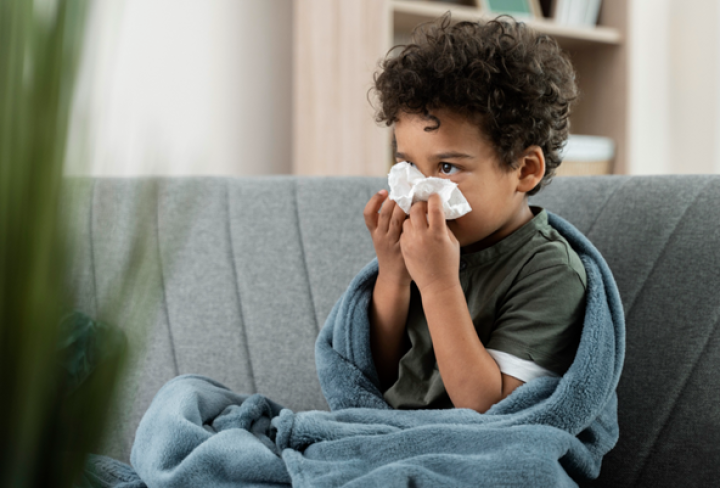Introduction
When it comes to our children’s health, it’s essential to stay informed about common ailments like the cold and cough. The common cold is a viral infection that affects the nose, ears, and throat and can easily spread from person to person through infected droplets. In this blog, we will explore the symptoms, causes, prevention, and treatment of coughs and colds in children, along with some helpful tips for parents.
What are the Symptoms of a Cold?
Cold symptoms in children often include a blocked or runny nose, sore throat, coughing, sneezing, and lethargy. Children may sometimes experience less common symptoms such as fever, rash, vomiting, or diarrhea. It’s important to note that some cold symptoms can be similar to Influenza, Adenovirus, or COVID-19, causing concern among parents. Knowing how to distinguish between these illnesses is crucial for prompt medical attention.
Causes of Coughs and Colds:
The primary cause of coughs and colds in children is viral infections. Contrary to popular belief, colds are not caused by exposure to cold weather or going out with wet hair or bare feet. However, in some cases, cold symptoms may be due to other conditions like bronchiolitis, sinusitis, whooping cough, pneumonia, asthma, croup, or even COVID-19 and other rare viruses.
Prevention Tips for Coughs and Colds
While it’s challenging to prevent all coughs and colds, there are proactive measures parents can take to reduce their child’s risk. Encouraging frequent handwashing, coughing or sneezing into the elbow, and avoiding sharing utensils and cups can help limit the spread of viruses. Adequate sleep and a balanced diet are also vital for maintaining a healthy immune system. Additionally, consider getting the influenza vaccine as recommended by your doctor, which can provide added protection.
Seeking Medical Help for a Cough or Cold
If your child experiences unpleasant symptoms or if you’re concerned about their condition, don’t hesitate to seek medical attention. Certain signs like wheezing, difficulty breathing, high fever with cold symptoms, and continuous vomiting may indicate a severe illness or a condition other than a common cold. In such cases, visiting a pediatrician is essential for a proper diagnosis and appropriate treatment.
Treatment for Coughs and Colds
Since coughs and colds are caused by viruses, antibiotics are not effective in treating them. The best approach is to let the child’s immune system fight the infection while ensuring they get plenty of rest and fluids. Honey has been shown to ease children’s coughs, especially at bedtime. However, over-the-counter cough medicines and certain supplements like zinc and vitamin C may not be as effective and should be used with caution. Always consult with your doctor before using any medications.
Complications of Coughs and Colds
In most cases, coughs and colds resolve without any complications. However, in some instances, a bacterial infection may develop after a viral illness, requiring medical attention. If your child’s symptoms persist or worsen after a week, it’s advisable to consult a doctor to rule out any complications or other underlying conditions.
Sending Your Child to School with a Cough
If your child is unwell, keeping them at home to rest and recover is best. This helps them heal and prevents the spread of the illness to others. In some cases, children may continue to cough for several weeks after recovering from the initial infection, known as a post-viral cough. If your child has a lingering cough but is otherwise well, consult with your doctor to determine if they can safely attend school.
Conclusion
Understanding the common cold and cough is essential for parents to ensure the well-being of their children. By recognizing the symptoms, taking preventive measures, seeking medical help when necessary, and following appropriate treatments, parents can help their children recover from coughs and colds more comfortably and minimize any potential complications. Remember that a healthy lifestyle, including a balanced diet and adequate sleep, plays a significant role in maintaining a strong immune system and reducing the frequency of illnesses. Stay informed and proactive in caring for your child’s health!

